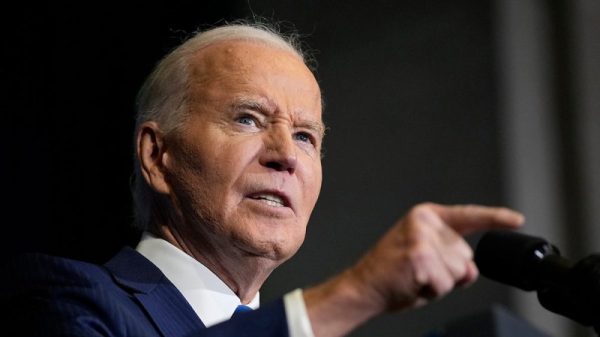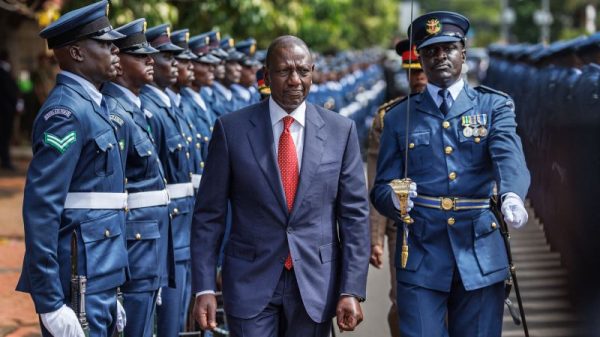Sens. Jon Tester, D-Mont., and Mike Rounds, R-S.D., introduced a resolution that would reverse the Biden administration’s recent action allowing beef imports from Paraguay.
Late last year, the Department of Agriculture (USDA), after diplomatic engagements, finalized a rule to lift a long-standing ban on beef imports from Paraguay, which had been in effect for years due to the South American nation’s history of cattle-borne disease. Tester, Rounds and a broad coalition of livestock and agricultural associations have loudly opposed the action over its potential impact on U.S. food supplies.
‘My message to the Biden Administration is simple: cutting corners to resume beef imports from a country with a recent history of foot and mouth disease is bad news for both Montana consumers and producers, and I won’t let it stand,’ Tester said in a statement. ‘Montana ranchers produce the best beef in the world, and it’s clear that the USDA doesn’t have the data to show that Paraguay meets the same animal health standards.’
‘That’s why I’m teaming up with Senator Rounds to overturn this decision from the Biden Administration that is giving a raw deal to American ranchers and could have dangerous impacts on our food supply,’ the Montana Democrat added.
The USDA’s Animal and Plant Health Inspection Service finalized regulations in November allowing Paraguayan beef imports and issued a series of conditions importers must meet to ensure livestock diseases are not present in shipped products. The agency then began implementation of the rules one month later, despite criticism from lawmakers and U.S. industry groups.
Paraguay’s livestock industry has a history of foot-and-mouth disease (FMD), which spreads quickly among livestock and could severely threaten the U.S. economy.
‘Paraguay, on the other hand, has historically struggled to contain outbreaks of foot and mouth disease,’ Rounds said. ‘Consumers across America should be able to confidently feed their families beef that they know has met the rigorous standards required in the United States.’
However, the South American country has for years lobbied the U.S. government to reverse the import ban, saying it would increase consumer choice for Americans.
According to a readout of a September meeting between the Paraguayan government and the White House Office of the United States Trade Representative, the two sides discussed the process to authorize the import of raw beef products. Paraguayan officials expressed their desire to resume raw beef product trade ‘as soon as possible.’
The USDA’s public comment period last year attracted letters from Paraguayan cattle industry associations and government agencies, including the Embassy of Paraguay to the United States, which stated that ‘Paraguayan beef will be a big success in the U.S. market.’
The comment period attracted widespread opposition from the National Cattlemen’s Beef Association (NCBA), regional affiliates of the group, the United States Cattlemen’s Association and the American Farm Bureau Federation. Those groups also endorsed the resolution introduced by Tester and Rounds.
‘USDA’s decision to allow Paraguayan beef imports into the U.S. creates an unnecessary risk to the health and safety of the U.S. cattle herd. U.S. cattle producers are held to the highest food safety and animal health standards in the world and any trade partner must be able to demonstrate they can meet those same standards,’ said Kent Bacus, NCBA’s executive director of government affairs.
‘Given Paraguay’s long history of foot-and-mouth disease outbreaks, it is simply too risky to allow Paraguayan imports without recent site visits to confirm Paraguay’s safety claims,’ Baucus continued. ‘U.S. cattle producers are thankful for the leadership of Senators Jon Tester and Mike Rounds for applying the Congressional Review Act to hold USDA accountable and protect our nation’s cattle herd.’
U.S. Cattlemen’s Association President Justin Tupper noted in a statement that the last time U.S. government officials inspected a meat processing facility in Paraguay was in 2014.
‘That nearly ten-year gap since the last site visit does not inspire confidence in Paraguay’s animal health and food safety protocols,’ Tupper said. ‘Further, in its regulatory impact analysis, USDA fully admits that there is a real possibility we could import beef from an animal infected by FMD. An outbreak of FMD in the United States would be devastating for both producers and consumers, causing lasting financial losses between $33 and $93 billion.’
The Livestock Marketing Association, National Farmers Union, Montana Farmers Union, Montana Stockgrowers Association, Montana Farm Bureau Federation and R-CALF USA also endorsed the resolution from Tester and Rounds.
The resolution, meanwhile, was introduced under the Congressional Review Act (CRA), a law dating back nearly three decades that allows Congress to revoke federal regulations with a simple majority vote. It represents one of the few times a Democrat has introduced a CRA resolution for a Biden administration rule.
USDA and the Embassy of Paraguay to the United States did not immediately respond to requests for comment.







































